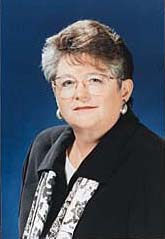![[Currents header graphic]](/homeart/currents_header.gif)
![[Currents header graphic]](/homeart/currents_header.gif)
January 25, 1999
By Tim Stephens
Speaking at the annual meeting of the American Association for the Advancement of Science, Chancellor Greenwood urged her fellow scientists to become directly involved in efforts to improve science education and the public's understanding of science. Greenwood, who is president of AAAS, advocated changes throughout the educational pipeline and proposed a national campaign to promote the involvement of scientists on school boards.

|
|
Chancellor Greenwood
|
While recent scientific discoveries and advances give scientists ample cause to celebrate, the United States may be slipping behind other nations in its ability to inspire and educate the next generation of scientists, said Greenwood at the meeting in Anaheim.
"We can already see indications that the next generation is not receiving the preparation necessary to maintain the excellence that U.S. science currently enjoys," Greenwood said, pointing to the results of recent surveys that show, for example, U.S. 12th graders near the bottom in international comparisons of science and math ability.
Greenwood urged scientists, engineers, and other scientifically literate professionals to get involved in kindergarten through 12th grade (K-12) education by serving on school boards. She proposed an AAAS program called "Project 20/20" to sustain and support these school board members with information and advice to help them protect and enhance scientific content and accuracy in schools.
"There is a tremendous opportunity to be a positive influence and to touch the widest possible array of the public by helping to determine such essential issues as curriculum reform, textbook choice, and pedagogy," Greenwood said.
Greenwood reiterated the familiar woes of the K-12 education system. With respect to science education, the problems range from teachers with inadequate training to superficial textbooks that are "an inch deep and a mile wide," she said. In addition, science education is threatened by creationists and other vocal minorities antagonistic towards science.
"Today, there are biology teachers who admit that they are too intimidated to teach evolution, so they omit the topic entirely from their curriculum," Greenwood said.
Greenwood also noted the particular scarcity of resources for schools with high minority populations, warning that the country risks losing a cadre of talented minorities and women through inattention to the value of diversity.
The education system is faltering in colleges and graduate schools, too, Greenwood said. "While much attention has been paid to the K-12 system, those of us who are college and university faculty must look in the mirror and address the responsibilities that we have for undergraduate education," she said.
Not only future scientists, but all students and indeed all citizens need to have a solid understanding of science, Greenwood noted. The scientific community itself must change to address the problems of inadequate knowledge and understanding of science in our society, she said.
First, Greenwood suggested improvements in undergraduate education to ensure that all students leave college with some expertise in the sciences. She also encouraged science faculty to become involved in the education departments and professional schools on their campuses.
"We must ensure that all undergraduate students have science, math, and technical skills for the 21st century [and] we must insist on science and math literacy in our professional schools," Greenwood said.
She also called for changes in graduate education to give young scientists the training they need to pursue a broad array of career opportunities in addition to traditional academic careers. Disputing the notion that universities are overproducing Ph.D. scientists, Greenwood said the real challenge is to prepare graduate students for a changing job market.
"The concept of offering too much education to too many people is absurd," Greenwood said.
Nevertheless, there is a clear need for increased breadth of training to produce graduates with the flexibility needed to take advantage of nontraditional career opportunities, she said.
Greenwood acknowledged that concern over science education and public understanding of science is hardly new. She also noted the many valuable education initiatives undertaken by scientific organizations, universities, government agencies, and industries. Nevertheless, she said, scientists need to reexamine their own behavior and enterprises in light of the needs of the broader society.
"We are living in a dynamic time in which our personal and professional lives change rapidly," Greenwood said. "Education for our children, and lifelong education for all of us, must be paramount in this evolving era."